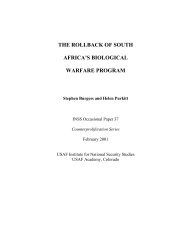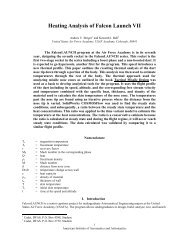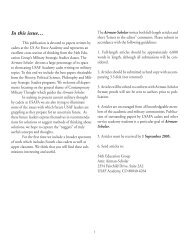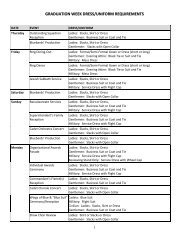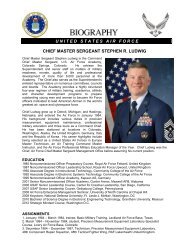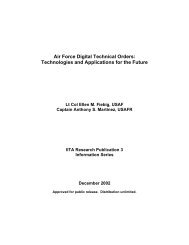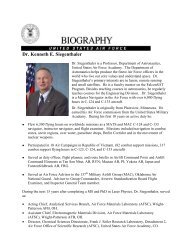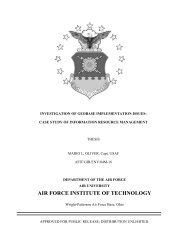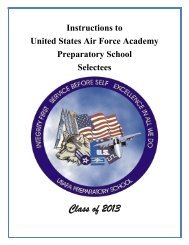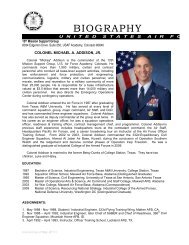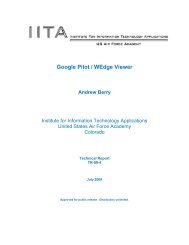Military Professionalism - United States Air Force Academy
Military Professionalism - United States Air Force Academy
Military Professionalism - United States Air Force Academy
You also want an ePaper? Increase the reach of your titles
YUMPU automatically turns print PDFs into web optimized ePapers that Google loves.
junior officers. Generals say that junior officer do not know what it is like to be a senior<br />
officer so they cannot judge the decisions of their leadership.<br />
Keskel, Kenneth, “The Oath of Office: A Historical Guide to Moral Leadership,”<br />
<strong>Air</strong> & Space Power Journal 16.4 (Winter 2002).<br />
http://www.airpower.au.af.mil/airchronicles/apj/apj02/win02/keskel.html<br />
By studying the key documents and events in America’s history, military officers can<br />
gain better insight into their oath of office and the moral implications of their actions.<br />
Junior officers should focus on how to well and faithfully discharge the duties of their<br />
office. For senior officers, the oath should carry even greater significance as they use a<br />
more indirect style of leadership to instill in their followers the service’s core values.<br />
Officers must develop the skills to make the appropriate leadership decisions when<br />
guidance may be vague on how best to support and defend the Constitution. They must<br />
take the time to identify capabilities for addressing the entire spectrum of conflict and<br />
wrestle with ways of resolving conflicting priorities in coalition warfare. Individuals at<br />
all levels must focus on the needs of the nation rather than on the desires of their services.<br />
Finally, officers must embrace the moral foundation symbolized in the phrase so help me<br />
God since it is the heart and soul of the success of future generations of soldiers, sailors,<br />
airmen, and marines.<br />
Kohn, Richard H. “Coming Soon: A Crisis in Civil-<strong>Military</strong> Relations.” World<br />
Affairs (Winter 2008).<br />
http://www.worldaffairsjournal.org/articles/2008-Winter/full-civil-military.html<br />
Kohn predicts that four problems will intensify the friction inherent in civil-military<br />
relations: 1. the endgame in Iraq, 2. unsustainable military budgets, 3. the mismatch<br />
between twenty-first century threats and a Cold War military establishment, and 4. social<br />
issues, such as allowing homosexuals to serve openly.<br />
Kohn, Richard H. “General Elections: The Brass Shouldn’t Do Endorsements.” The<br />
Washington Post (Sept. 19, 2000): A.23.<br />
The slide towards partisanship signifies a serious erosion of military professionalism.<br />
Since Vietnam, many officers have conflated the role of advice with advocacy, not just in<br />
private but publicly, and not only for service or professional needs but for policy<br />
outcomes to their likening. Partisanship suggests that this generation may not be content<br />
merely to advise the government.<br />
14




